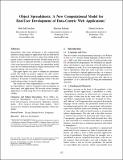Object spreadsheets: a new computational model for end-user development of data-centric web applications
Author(s)
McCutchen, Richard Matthew; Itzhaky, Shachar; Jackson, Daniel
DownloadObject spreadsheets.pdf (273.3Kb)
OPEN_ACCESS_POLICY
Open Access Policy
Creative Commons Attribution-Noncommercial-Share Alike
Terms of use
Metadata
Show full item recordAbstract
Spreadsheets offer many advantages as the computational and data-storage engine for applications that are authored by end users. Paradoxically, however, their main failing in this regard is their computational model. Despite being used in almost all cases to represent data that is essentially relational (with some hierarchical structuring), the spreadsheet model treats the two-dimensional grid as largely unstructured, with formulas linking cells in an ad hoc way.
This paper reports on a quest to rethink the spreadsheet model. The model we propose supports not only conventional flat tables, but also nested variable-size lists and object references. It includes a formula language suited to the data model and procedures to specify updates.
The model has been implemented in a tool called Object Spreadsheets, which is intended for the development of data-centric web applications. We describe several example applications we built using the tool to demonstrate its applicability.
Date issued
2016-11Department
Massachusetts Institute of Technology. Computer Science and Artificial Intelligence Laboratory; Massachusetts Institute of Technology. Department of Electrical Engineering and Computer ScienceJournal
Proceedings of the 2016 ACM International Symposium on New Ideas, New Paradigms, and Reflections on Programming and Software - Onward! 2016
Publisher
Association for Computing Machinery
Citation
McCutchen, Matt, et al. "Object Spreadsheets: A New Computational Model for End-User Development of Data-Centric Web Applications." Onward! 2016 Proceedings of the 2016 ACM International Symposium on New Ideas, New Paradigms, and Reflections on Programming and Software, 2-4 November, 2016, Amsterdam, Netherlands, ACM Press, 2016, pp. 112–27.
Version: Author's final manuscript
ISBN
978-1-4503-4076-2